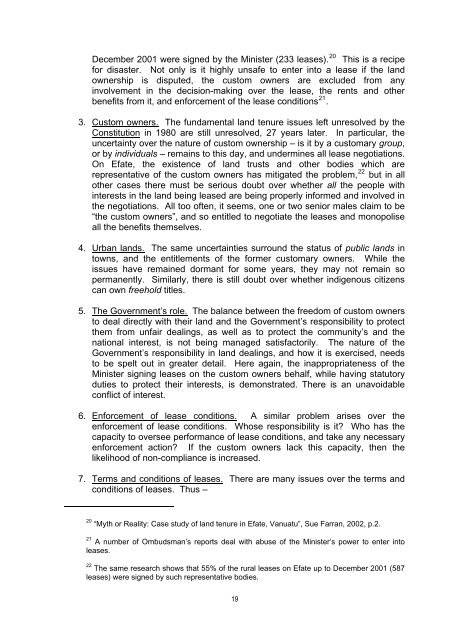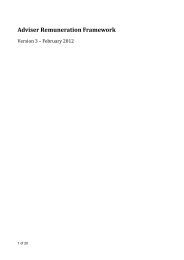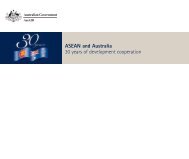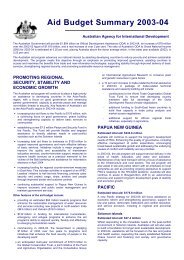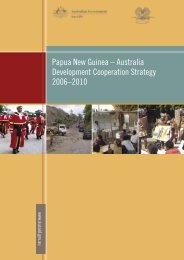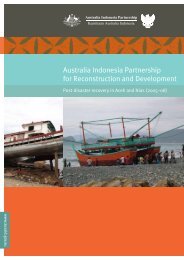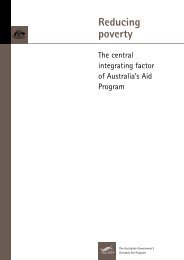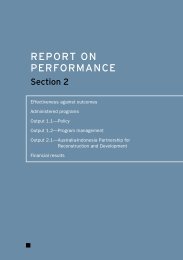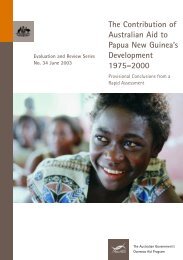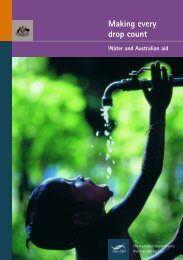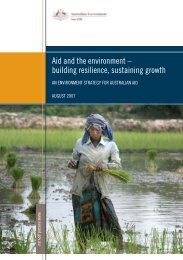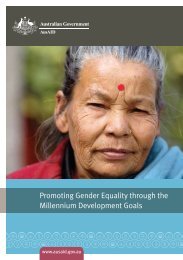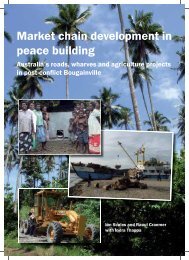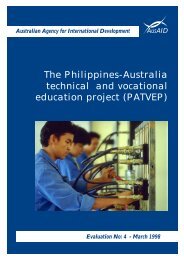Vanuatu Review of National Land Legislation, Policy and ... - AusAID
Vanuatu Review of National Land Legislation, Policy and ... - AusAID
Vanuatu Review of National Land Legislation, Policy and ... - AusAID
Create successful ePaper yourself
Turn your PDF publications into a flip-book with our unique Google optimized e-Paper software.
December 2001 were signed by the Minister (233 leases). 20 This is a recipefor disaster. Not only is it highly unsafe to enter into a lease if the l<strong>and</strong>ownership is disputed, the custom owners are excluded from anyinvolvement in the decision-making over the lease, the rents <strong>and</strong> otherbenefits from it, <strong>and</strong> enforcement <strong>of</strong> the lease conditions 21 .3. Custom owners. The fundamental l<strong>and</strong> tenure issues left unresolved by theConstitution in 1980 are still unresolved, 27 years later. In particular, theuncertainty over the nature <strong>of</strong> custom ownership – is it by a customary group,or by individuals – remains to this day, <strong>and</strong> undermines all lease negotiations.On Efate, the existence <strong>of</strong> l<strong>and</strong> trusts <strong>and</strong> other bodies which arerepresentative <strong>of</strong> the custom owners has mitigated the problem, 22 but in allother cases there must be serious doubt over whether all the people withinterests in the l<strong>and</strong> being leased are being properly informed <strong>and</strong> involved inthe negotiations. All too <strong>of</strong>ten, it seems, one or two senior males claim to be“the custom owners”, <strong>and</strong> so entitled to negotiate the leases <strong>and</strong> monopoliseall the benefits themselves.4. Urban l<strong>and</strong>s. The same uncertainties surround the status <strong>of</strong> public l<strong>and</strong>s intowns, <strong>and</strong> the entitlements <strong>of</strong> the former customary owners. While theissues have remained dormant for some years, they may not remain sopermanently. Similarly, there is still doubt over whether indigenous citizenscan own freehold titles.5. The Government’s role. The balance between the freedom <strong>of</strong> custom ownersto deal directly with their l<strong>and</strong> <strong>and</strong> the Government’s responsibility to protectthem from unfair dealings, as well as to protect the community’s <strong>and</strong> thenational interest, is not being managed satisfactorily. The nature <strong>of</strong> theGovernment’s responsibility in l<strong>and</strong> dealings, <strong>and</strong> how it is exercised, needsto be spelt out in greater detail. Here again, the inappropriateness <strong>of</strong> theMinister signing leases on the custom owners behalf, while having statutoryduties to protect their interests, is demonstrated. There is an unavoidableconflict <strong>of</strong> interest.6. Enforcement <strong>of</strong> lease conditions. A similar problem arises over theenforcement <strong>of</strong> lease conditions. Whose responsibility is it? Who has thecapacity to oversee performance <strong>of</strong> lease conditions, <strong>and</strong> take any necessaryenforcement action? If the custom owners lack this capacity, then thelikelihood <strong>of</strong> non-compliance is increased.7. Terms <strong>and</strong> conditions <strong>of</strong> leases. There are many issues over the terms <strong>and</strong>conditions <strong>of</strong> leases. Thus –20 “Myth or Reality: Case study <strong>of</strong> l<strong>and</strong> tenure in Efate, <strong>Vanuatu</strong>”, Sue Farran, 2002, p.2.21 A number <strong>of</strong> Ombudsman’s reports deal with abuse <strong>of</strong> the Minister’s power to enter intoleases.22 The same research shows that 55% <strong>of</strong> the rural leases on Efate up to December 2001 (587leases) were signed by such representative bodies.19


